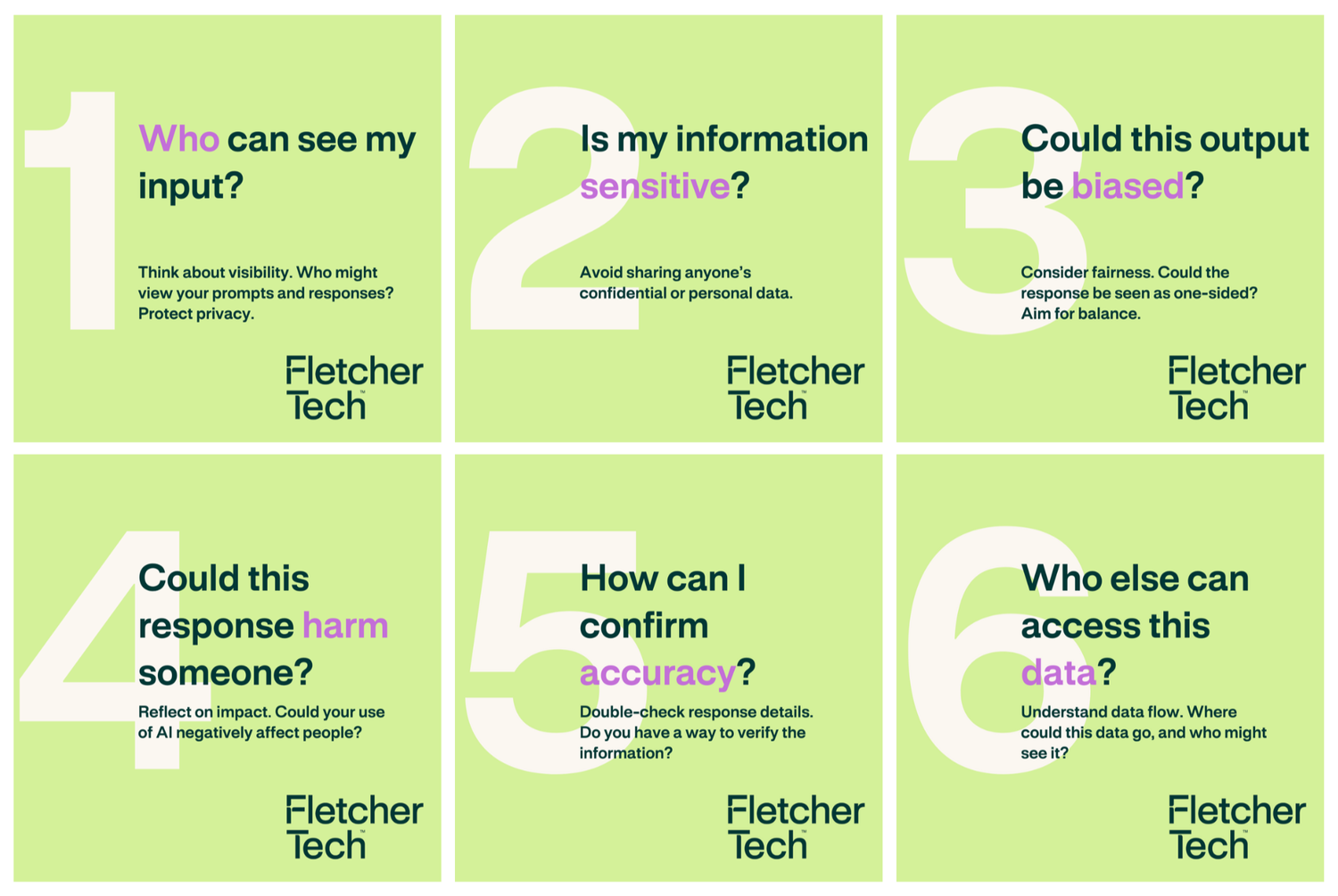FletcherTech’s commitment to responsible AI
Introduction
FletcherTech is a leader in innovative building solutions. As we continue to integrate advanced technologies into our operations, the role of Artificial Intelligence (AI) is becoming increasingly significant. AI is a powerful tool that can enhance our productivity and improve our lives. It is here to stay - so we should look to understand and leverage it effectively. In modern organizations, AI is not just a tool but a transformative force that can drive efficiency, innovation, and growth. However, with great power comes great responsibility. Using AI responsibly and safely is key to it being a positive influence and one that can really make a difference both at work and in your personal life. This is where responsible AI practices come into play, ensuring that our AI systems are ethical, transparent, and beneficial to all stakeholders.
AI is not just a tool but a transformative force that can drive efficiency, innovation, and growth.
Understanding Responsible AI
What is Responsible AI? At its core, responsible AI refers to the development and deployment of AI systems that adhere to ethical guidelines and principles. These principles include fairness, accountability, transparency, and privacy. By implementing responsible AI, organizations can mitigate risks and enhance the positive impact of AI technologies.
Ethical Considerations in AI Implementation
Considering the ethics of any AI usage is crucial. This involves ensuring that AI systems do not perpetuate biases, cause harm, or infringe on privacy. Ethical AI practices also promote transparency, allowing stakeholders to understand how AI decisions are made.
Benefits of Responsible AI in Organizational Contexts
Responsible AI can enhance trust among stakeholders, improve decision-making processes, and ensure compliance with regulatory standards. It also fosters a culture of accountability and continuous improvement within the organization.
With great power comes great responsibility

Questions to Consider when Creating AI Prompts
Key Questions to Ask When Developing AI Prompts
Creating AI prompts that are safe and effective requires careful consideration. Here are some key questions to guide you:

- What is the main goal of this prompt? Clearly define what you want to achieve.
- Is the prompt clear and specific? Avoid ambiguity to ensure precise responses.
- Does the prompt align with our organizational objectives? Ensure it supports our broader goals.

- Are there any potential biases in the prompt? Check for language that could lead to biased or unfair outcomes.
- Could the prompt harm someone? Consider the impact on individuals and groups.
- Is the prompt respectful and inclusive? Ensure it promotes fairness and equality.

- Is the information being used sensitive? Ensure you are not exposing confidential data.
- Who else can access this data? Understand the data sharing policies.
- Are we compliant with data protection regulations? Verify adherence to legal standards.

- Who will be impacted by the AI’s output? Identify the stakeholders and their interests.
- How will the AI’s response be used? Ensure the response is appropriate for its intended use.
- Is the output understandable and actionable? Make sure it is clear and useful for the audience.

- How will you validate the AI’s response? Plan for reviewing and verifying the output.
- What measures are in place to maintain accuracy and quality? Implement checks and balances.
- Is there a feedback loop for continuous improvement? Ensure ongoing refinement and enhancement.
Expanding on Responsible AI Practices
To delve deeper into responsible AI, it is essential to understand the broader implications of AI ethics. Responsible AI is not just about avoiding harm but actively promoting positive outcomes. This includes designing AI systems that are inclusive and accessible to all users, regardless of their background or abilities.

Fairness and Inclusivity
Ensuring fairness in AI involves creating systems that do not discriminate against any group. This requires continuous monitoring and adjustment of AI algorithms to prevent biases. Inclusivity means designing AI that can be used by everyone, including those with disabilities. This can involve incorporating features like voice recognition for those who cannot use traditional input methods.
Transparency and Accountability
Transparency in AI means making the decision-making processes of AI systems understandable to users. This can be achieved through clear documentation and user-friendly explanations of how AI systems work. Accountability involves having mechanisms in place to address any issues that arise from AI use. This can include setting up a dedicated team to handle AI-related concerns and ensuring there are clear channels for reporting and resolving problems.
Privacy and Security
Protecting user privacy is paramount in AI development. This involves implementing robust data protection measures and ensuring that AI systems comply with relevant privacy laws and regulations. Security measures should also be in place to protect AI systems from cyber threats. This includes regular security audits and updates to address vulnerabilities.
Continuous Improvement
Responsible AI is an ongoing process. It requires continuous learning and adaptation to new challenges and developments in the field. This can involve staying updated with the latest research in AI ethics, participating in industry forums, and collaborating with other organizations to share best practices.
Fostering a Culture of Responsibility
At FletcherTech, fostering a culture of responsibility means encouraging all employees to be mindful of the ethical implications of their work. This can be achieved through regular training sessions on AI ethics, creating a supportive environment where employees feel comfortable raising concerns, and recognizing and rewarding efforts to promote responsible AI practices.

Conclusion
In conclusion, responsible AI is about more than just avoiding harm; it’s about actively creating positive outcomes and ensuring that AI technologies benefit everyone. By adhering to ethical principles, asking the right questions, and fostering a culture of responsibility, FletcherTech can continue to lead the way in innovative and ethical AI practices. Let’s work together to ensure that our AI systems are not only powerful but also safe, transparent, and fair.